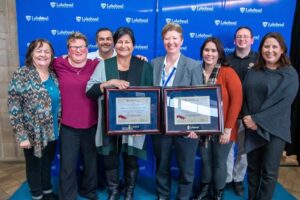New funding to help evaluate app targeted at improving mental health of Indigenous people in the workplace

By Rick Garrick
THUNDER BAY — Lakehead University researcher Vicki Kristman and the Nokiiwin Tribal Council are evaluating the effectiveness of a Wiiji e-mental health app through $367,200 in Canadian Institutes of Health Research (CIHR) funding. The Wiiji app was developed during a CIHR Catalyst Grant: Work Stress and Wellbeing Hackathon attended by Kristman, Audrey Gilbeau, executive director at Nokiiwin Tribal Council, and a Nokiiwin Tribal Council community citizen in 2017.
“The idea was to come up with a template over a weekend,” says Kristman, associate professor in Health Sciences and director of Lakehead University’s Enhancing the Prevention of Injury and Disability at Work Research Institute. “The event was called a hackathon, it’s a very fast event. You’re paired up with programmers and developers who can help you either develop an app, a website or some sort of e-health mechanism. Our objective was to develop an app that would address lateral violence in the workplace for the communities of the Nokiiwin Tribal Council.”
Kristman and her team will be conducting research on the Wiiji app’s effectiveness in improving the mental health of Indigenous people in the workplace for up to three years in partnership with the Nokiiwin Tribal Council, which provides services for five First Nations, including Biinjitiwaabik Zaaging Anishinaabek, Netmizaaggamig Nishnaabeg, and Fort William First Nation.
“Indigenous individuals are less likely to seek help for mental health,” Gilbeau says. “This is a major concern among communities of the Nokiiwin Tribal Council.”
Kristman says a major feature of the Wiiji app is a peer support component so people who are experiencing lateral violence in the workplace would be able to reach out to talk with someone who understood the issues they are going through.
“We did sharing circles with the communities to understand what they would really want from the app,” Kristman says, noting that the research indicated the communities wanted to respect Indigenous culture and to have Anishinaabemowin incorporated into the app. “So we took all that feedback from the communities and we worked with First Response Mental Health to create the Wiiji. The Wiiji has a number of aspects, one of them is the peer support so people can use that, they can identify who they want as their peer supporters, and then if they are in need, they just hit a button and that sends out a link to all their peer supporters.”
Kristman says the communities also indicated that they wanted to have positive stories about mental health challenges that people from the communities had overcome and conquered included in the Wiiji app.
“We are including those in the app under the news feed,” Kristman says. “The app coordinator, who is located at the Nokiiwin Tribal Council, posts different things about language related to Indigenous culture, so there is lots of information that gets posted there. There is also an events tab so events within the Nokiiwin Tribal Council get posted there for the communities.”
Kristman says Nokiiwin Tribal Council’s resource guide is also incorporated into the Wiiji app.
“It’s fully searchable, you can search it by specific key words,” Kristman says. “There’s all different types of search strategies that you can use to search all of the information in there.”
Kristman says the primary goal of the research is to evaluate the Wiiji app for improvement in Indigenous workplace mental health, noting that they will be using a mixed-methods approach to conduct the study.
“If the app can assist workers, it may have the potential to increase Indigenous participation in employment, reduce work disability and improve the mental health of the Indigenous population,” Kristman says. “This will return economic and health benefits to Indigenous employers, communities, families and individuals.”

